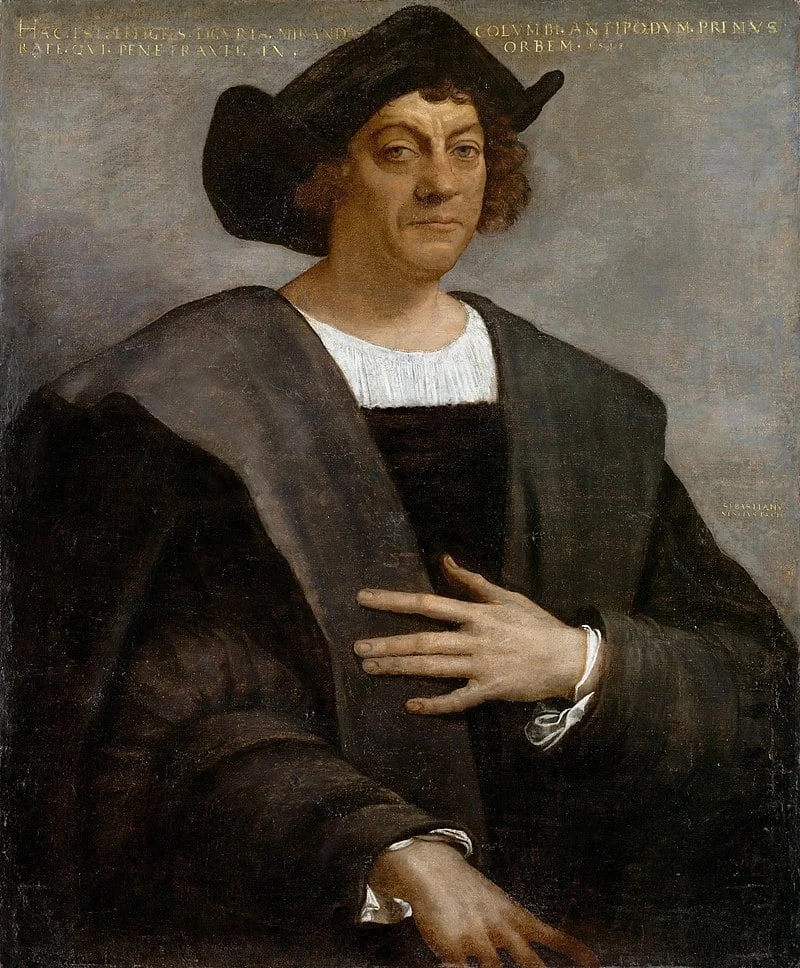Real Celebrities Never Die!
OR
Search For Past Celebrities Whose Birthday You Share

source:wikimedia.org
Christopher Columbus
Birthday:
31 Oct, 1451
Date of Death:
20 May, 1506
Cause of death:
Heart failure
Nationality:
Italian
Famous As:
Maritime explorer
Age at the time of death:
54
Christopher Columbus's Quote's
Early Life and Background
Christopher Columbus was a renowned Italian explorer and navigator well known for his voyages across the Atlantic Ocean in the late 15th century, which opened the way for European exploration and colonization of the Americas. Christopher Columbus was said to have been born on October 31, 1451 (there is lack of clarity about the exact date), in the Republic of Genoa or current Italy. He was the son of Domenico Colombo, a weaver who worked in Genoa and owned a cheese stand. Columbus’ early life was involved with him working for his father in the cheese stand and later as a business agent in Genoa.
Life in Portugal and Spain
In 1477 he sailed to Lisbon and later lived in Portugal until 1485. In Portugal, he got married to Felipa Perestrello e Moniz, a Portuguese noble’s daughter, but unfortunately, she passed away in 1485, and Columbus moved to Castile. Despite not being scholarly, Columbus learned three languages including Latin, Portuguese, and Castilian, and studied various subjects casting his ideas about the world. His exploration and journeys in 1492 marked the eventual conquest of the Americas by the Europeans.
The 1492 Expedition and Voyage to the Americas
It began in 1492 when Columbus sought a westward route to Asia to access valuable goods. Inspired by Paolo dal Pozzo, he presented a plan to get to the East Indies to various rulers but faced multiple rejections. Columbus believed that his voyages could fulfill the biblical prophecies and deliver Jerusalem from Muslim control. Despite knowing the spherical shape of the earth, Columbus miscalculated the size and underestimated the distance to Asia. In 1492, Columbus was granted the support, promising titles, and entitlement by the Catholic Monarchs, Ferdinand and Isabella of Spain, leading to his historic journey to westward Asia.
First Voyage and Discovery of the New World
On August 3, 1492, Christopher Columbus began his first voyage which involved three ships: Santa María, Pinta, and Niña. He departed from Palos de la Frontera and sailed to the Canary Islands for provisions and repairs before heading to the West. On October 11, 1492, Columbus landed in the current-day Bahamas and named it San Salvador. He made contact with the indigenous people who lived there like Lucayan, Taíno, and Arawak, mistaking that he reached Asia. Columbus explored the Caribbean, including Cuba and Hispaniola. Unfortunately, his ship Santa María ran ashore and had to be abandoned. In 1493 March, Columbus reached Spain, ending his first voyage.
Second Voyage and Establishment of Colonies
Columbus’ second voyage from 1493 to 1496 aimed to establish permanent colonies, sailing with 17 ships. He further explored the Caribbean, naming islands like Dominica and Montserrat. Upon arriving at La Navidad, Columbus found it destroyed by the Taino and established La Isabela. Disease and famine started spreading and affected the settlers. Columbus started using the encomienda system where the Spanish colonies were forced to do labor to encourage colonization. People started accusing the tyranny, and the news reached Spain, which led to the arrest of Columbus by Francisco de Bobadilla. Later, the sovereigns restored his freedom and also funded his fourth voyage.
Third Voyage and Return to Spain
Columbus’s third voyage began in 1498 and ended with him returning to Spain in 1500 after failing his mission. He reached Trinidad and started exploring the South American coast. After reaching Hispaniola, he faced multiple rebellions and accusations, which prompted his return to Spain. Despite the challenges he faced, he secured a fourth voyage with royal support.
Fourth Voyage and Final Exploration
His fourth voyage from 1502 to 1504 aimed to find the westward route to Asia. While departing in May 1502, he faced storms and reached Central America in 1503. There he explored Honduras, Nicaragua, and Costa Rica, searching for a way to the Indian Ocean. Columbus and his men were stranded in Jamaica, but his prediction of the lunar eclipse helped him gain favor with the natives, and he was rescued in June 1504 by the ships sent by the governor in Hispaniola, concluding his final voyage.
Death and Legacy
Christopher Columbus died on May 20, 1506, in Valladolid, Spain, at the age of 54. After his fourth voyage, he faced many difficulties and controversies, including backlash for his governance of the colonies and accusations of mistreatment. Despite the controversies, he played a major role in connecting the Eastern and Western hemispheres and left a complex legacy as the explorer whose voyages connected Europe with the Americas.
Name:
Christopher Columbus
Popular Name:
Christopher Columbus
Gender:
Male
Cause of Death:
Heart failure
Spouse:
Place of Birth:
Genoa, Republic of Genoa
Place of Death:
Valladolid, Castile
Occupation / Profession:
Christopher Columbus is an Anglicization of his real name, given to him in Genoa where he was born: Cristoforo Colombo.
Christopher Columbus was given a rank in the military.
Columbus was a very religious man who believed that God had singled him out for his voyages of discovery.
Columbus is credited with discovery of the Caribbean and South America
He captained the Santa Maria expedition ship
He has done the first recorded transatlantic voyage.
